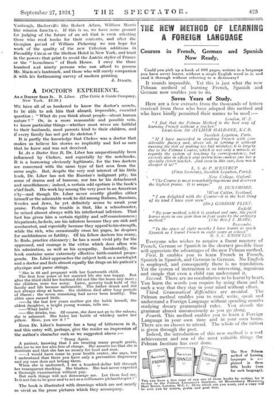A DOCTOR'S EXPERIENCE.
WE have all of us hankered to know the doctor's secrets, to be able to ask him that absurd, impossible, essential question : " What do you think about people—about human nature ? " Or, in a more reasonable and possible vein, to know particular things—whether most wives are faithful to their husbandi, most parents kind to their children, and if every family has not got its skeleton ?
It _is partly the knowledge that Chekov was a doctor that makes us believe his stories so implicitly and feel so sure that he knew and was not deceived.
In As a INktor Sees It, Dr. Liber has unquestionably been influenced by Chekov, and especially by the notebooks. It is a borrowing obviously legitimate, for the two doctors are concerned with the same type of fact seen from the same angle. But,- despite the very real interest of his little book, Dr. Liber has not the Russian's indignant pity, his sense of drama and of humour, nor has he his detachment and unselfishness ; indeed, a certain odd egotism is the book's chief fault. His work lay among the very poor in an American city—and though Dr. Liber never overtly glorifies either himself or the admirable work he did among Italians, Russians, Swedes and Jews, • he yet_ definitely seems to await your praise. Perhaps the trouble is that, like a schoolmaster, he mixed almost always with his intellectual inferiors. That fact has' given him a certain rigidity and self-consciousness ; his patients, he feels, are his inferiors because they are sick and uneducated, and especially because they appeal to his strength, while the rich, who occasionally cross his pages, he despises for snobbishness or futility. Of his fellow doctors too many, in finds, practice chicanery ; he has a most vivid pity for the oppressed, and courage is the virtue which does often win his admiration, as well as his sympathy. Incidentally, the book contains some extremely effective birth-control propa- ganda. Dr. Lihei approaches the subject both as a sociologist and a doctor and feels almost equally the drags on his patient's physique and purse strings.
" She is 48 and pregnant with her fourteenth child. The first four years of her married life she was happy. But after the third child her husband did not like the home any more ; the children were too noisy. Later, poverty took hold of the family and life became unbearable. The father drank and did not always sleep at home. Six children died after long periods of illness ; the seven remaining had never been healthy. The older ones earned little.
—In the last few years mother got the habit herself, the oldest daughter, a bright young woman, tells me. What habit ?
She drinks, too. Of course, she does not go to the saloon; she is ashamed. She hides her bottle of whiskey under her pillow. Here, you see it ? "
Even Dr. Liber's humour has a tang of bitterness in it, and this entry will, perhaps, give the redder an impression of the author's character such as we suggested above :- " Stung Again. A patient, knowing that I am treating many people gratis, asks me to see her also free of charge. She assures me that she is destitute and that she has no money for food and rent. —I would have come to your health center, she says, but I understand that there you have only a preventive dispensary and my case does not belong there. When she is Undressed, I see a hundred-dollar bill through her transparent stocking. She blushes. She had never expected a thorough examination without pay. But such things will not discourage me. Let them fool me. Is it not fun to be poor and to act as a millionaire philanthropist ? "
The book is illustrated with drawings which are not nearly so vivid as the prose pictures which they accompany.






































 Previous page
Previous page